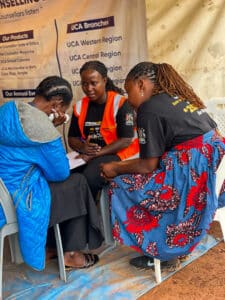Kiteezi Landslide Highlights Urgent Need for Mental Health Care in Climate Disaster Responses
On August 9, tragedy struck when a mountain of garbage collapsed in Uganda’s capital of Kampala, killing 35 people. The Kiteezi landfill has served as Kampala’s only waste dump for decades, receiving 2,500 tons of waste daily. The landslide buried dozens of homes near the site on the outskirts of the city, displacing around a thousand people, while dozens remain missing.
Climate change has intensified weather patterns, leading to more frequent and severe torrential rains, like those battering parts of East Africa in the last month. The relentless downpours resulted in widespread flooding and damage, triggering the inevitable landslide at Kiteezi. Kampala Mayor Erias Lukwago told the AFP news agency it was “a disaster [that] was bound to happen.”
 This event is just one example of how climate change is directly impacting vulnerable communities, causing not only physical destruction but psychological distress. As a direct response, StrongMinds joined other organizations, such as the Red Cross, on the ground providing relief to those affected by the destruction.
This event is just one example of how climate change is directly impacting vulnerable communities, causing not only physical destruction but psychological distress. As a direct response, StrongMinds joined other organizations, such as the Red Cross, on the ground providing relief to those affected by the destruction.
As of last week, we have trained over 12 people to offer mental health support within the community and have started administering depression screenings and enrolling people in therapy groups to help them cope with the disaster.
The collapse of the Kiteezi landfill is a stark reminder of the increased need for a mental health care approach as part of a holistic climate emergency/disaster response.
